The Jewish National Fund is trying to evict the Sumarins from the home they have lived in for 30 years – if Annexation goes ahead then thousands of Palestinian homes in the West Bank will be declared ‘abandoned’

The 1950 Absentee Property Law [APL] was the main legal instrument used by Israel to steal the land belonging to the three-quarters of a million Palestinians who were expelled from Israel as well as thousands of Palestinian who continued to live in Israel.
The Custodian of Absentee Property [CAP] took charge of this land and over 2 million dunams, were given to the Jewish National Fund, a para-state body whose constitution specifies that land it controls is for the sole benefit of Jews. The JNF was incorporated in Israel by the 1953 JNF Status Law.
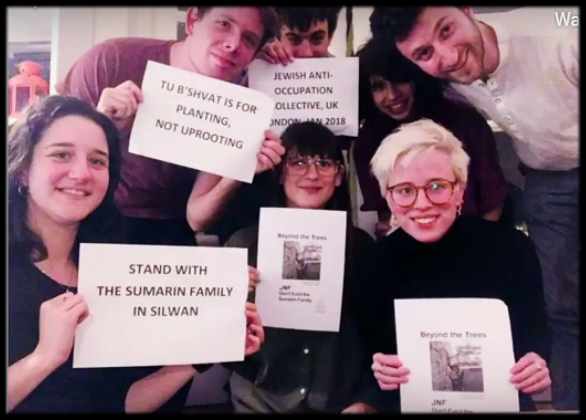
The criteria for transferring land to the CAP was that its owner was residing in an ‘enemy’ country, i.e. the surrounding Arab countries that the refugees had fled to. The APL was to last as long as a State of Emergency lasted in Israel. In fact a State of Emergency has lasted continuously since 1948, not because there is an emergency but because ‘security’ in Israel is a good pretext for confiscating Arab land.
What was particularly outrageous about the APL was that even Palestinians who had fled for safety to a neighbouring village a mile away in 1948 found that they were declared Present-Absentees, a truly Orwellian term. They were both Present and Absent, thus enabling the ‘socialist’ Kibbutzim to take over the lands they had always coveted from their Arab neighbours.
Of course the provisions of the Absentee Property Law have NEVER been applied to Jews because Israel is a Jewish state and Jewish Settlement is enshrined in the Jewish Nation State Law.
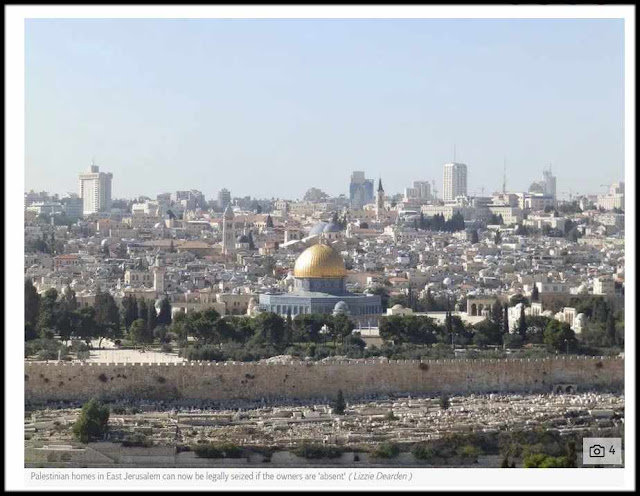
In 1967 with the conquest of East Jerusalem [EJ] and the West Bank, Israel annexed EJ and applied Israeli law to it, including the APL. Virtually all property in EJ therefore fell under the CAP because the owners and residents were living after 15 May 1948 in what was an ‘enemy country’, Jordan yet now the property was located in Israel.
Because an application of the APL to all the Arab residents would have meant, effectively, a new expulsion of Palestinians, the Knesset in 1970 passed the ‘Law and Administration Procedures Law’ to exempt those living in Jerusalem. However it didn’t apply to residents of the West Bank who had property in EJ.

Likewise residents of EJ who owned property in West Jerusalem which had always been part of Israel were still considered Absentees in respect of that property. However Israelis who owned property in EJ which they had been forced to abandon would now be able claim that property. Here we see how the law clearly operates in a racist manner.
Shortly after the 1967 War, in government meetings of 22 November 1968 and 3 February 1969, a decision was taken not to apply the APL to EJ except in the case of empty property. The assumption being that, unlike 1948, when the Palestinians were forced out, the situation in EJ was different and there were no prospects of ‘encouraging’ the original inhabitants to leave. Jerusalem was too much in the public eye for there to be mass expulsions.

However from 1977 onwards a new decision of the Israeli government enabled the seizure of almost all property that complied with the broader definition of “absentee property”. This decision had very severe consequences for EJ Palestinians. During the 1980s, an accelerated process of settler take-over of properties began.
In 1992, the application of the APL by the CAP to facilitate settlement expansion in EJ was revealed in a report concluded by the Klugman Committee [KC] (‘the Klugman Report’) [KR]. The KC identified 68 properties in EJ that were transferred, with the assistance of the State of Israel, from Palestinians to Jewish organisations. The KR strongly criticised the CAO’s actions, including its transfer of the absentee property to settler organisations.

However in 1997, the limitations on exercising the APL were further reduced and in June 2004, the Ministerial Committee for Jerusalem Affairs decided to revive the use of the APL in the manner observed between 1977 and 1992.
This was despite the then-Attorney General, ‘Meni’ Mazuz, sending a strongly-worded letter to Netanyahu, who was the Minister responsible for the office of the CAP) ordering the immediate cessation of the application of the APL to EJ property belonging to residents of the West Bank. Mazuz ordered the Government to return to the policy that preceded the ministerial decision, namely not to use its powers regarding those properties except in special circumstances and subject to the approval of the Attorney General. However this remained a dead letter.
On 15 April 2015, the Supreme Court ruled affirming the applicability of the APL to properties in EJ belonging to Palestinians living in the West Bank and approving all past expropriations that were carried out under the Law. However while approving the overall application of the Law to EJ properties owned by West Bank Palestinians, the Supreme Court established important criteria regarding the implementation of the Law in EJ. The Court held that as a general rule, the Law shall be implemented to EJ properties owned by West Bank Palestinians only in very rare and extreme cases (some of the judges could not even imagine that such cases exist).

The Sumarin family
Today in EJ, applications to the CAP are an integral part of the process of transferring most rights in property. Applications to the CAP can be made at the stage of ownership transfer or even before. The Recorder of Deeds asks the buyer to apply to the CAP and get a certificate from him stating that the property is not an absentee property.
[The information above comes from a Legal Memo prepared for the Norwegian Refugee Council of February 2017].

The Sumarin Family
In 1989 the JNF applied to the Custodian for Absentee Property to have the Sumarin family home declared absentee property. This was despite members of the family having lived in the house continuously for 30 years. The Custodian deemed it abandoned without the family’s knowledge.
The eviction attempts have been spearheaded by Himanuta, a subsidiary of the Jewish National Fund (KKL-JNF) which declares itself as a real estate agency. Their purpose is to hand the property to Jewish settlers. The property was transferred to KKL-JNF along with a host of other Palestinian properties in Silwan.
Following taking over the ownership of the Sumarin home, the KKL-JNF filed an eviction suit against the Sumarin family in 1991. The lawsuit was dismissed but KKL-JNF appealed and continued the proceedings repeatedly for nearly 30 years.
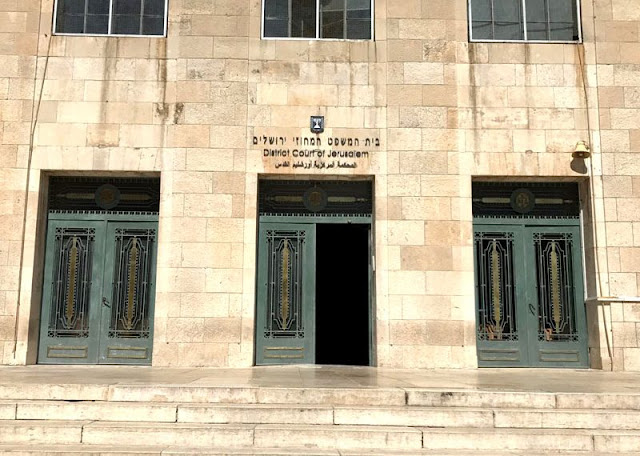
Jerusalem District Court
On June 29th, 2020 the family lost an appeal in the Jerusalem District Court, which gave the green light for their eviction. The family, with support from an international network of activist, crowdfunded to submit an appeal to the Supreme Court. The court’s declaration that it will hear the appeal temporarily delays the eviction.
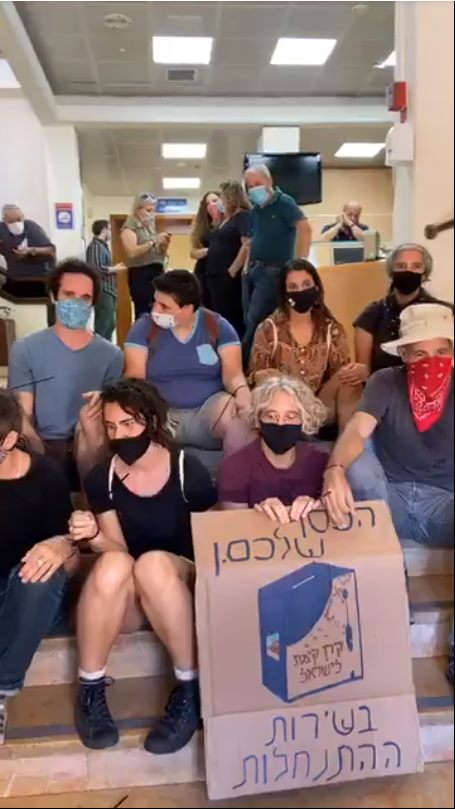
Blockade of JNF headquarters in Jerusalem
An international campaign, led by the Sumarin family and including Jewish Israeli groups, has developed to prevent the eviction. In the UK, human rights campaigners have spoken out prominently against the eviction. A cross-party group 69 MPs has signed Early Day Motion 529, which condemned the eviction. In Jerusalem, on the day of the court decision, activists from “Free Jerusalem” and “All That’s Left” chained themselves to the entrance of the JNF-KKL headquarters: nine protesters were arrested.
Zionist Colonialism is Alive and Thriving in 2020
What these actions show is that neither Zionism nor Zionist Colonialism is dead. Many liberal Zionists imagined that with the achievement of statehood in 1948 that the Zionist architecture of the Israeli State could be dismantled. It is arguable, at least from a Zionist point of view, that the JNF had to be established in order to provide land for the Zionist colonists before the establishment of statehood.
But what possible pretext could there be for the continuation of the existence of the JNF beyond 1948 unless the continuation of colonisation was envisaged? Not only that but after the expulsion of the Palestinian refugees the Israeli state either handed outright or sold very cheaply over 2 million dunums of land (each dunum is a ¼ of an acre) to the JNF.

The Sumreen family pose for a photo in their East Jerusalem home, March 23, 2018.Credit: Olivier Fitoussi
The reason of course for the continuation of the JNF and the Jewish Agency was that the Israeli government and these Zionist institutions were intent on the ‘ingathering of the exiles’. Jewish immigration at the expense of the native Palestinians. That was why Israeli Arabs were put under military law from 1948-1966. It was not because there was any serious concern about a fifth column but because this was necessary to keep the Arabs off the land, which was kept empty until the new Jewish immigrants arrived.
This was in other words nothing less than a piece of racial engineering carried out under the guise of security.
How Israel’s Theft of Land from the Palestinians in Israel works
The establishment in law of the JNF in 1953, a law which wrote the JNF’s Memorandum of Association (constitution), could only have one meaning. The Israeli state wanted to continue with a policy of ethnic cleansing but in such a way that its hands were not seen to be dirty.

Signing the Covenant between the JNF and the Government – pledging to steal as much Palestinian land as possible
In addition to the JNF having the special status of a private institution with public powers under the 1952 and 1953 World Zionist Organisation – Jewish Agency (Status) and Jewish National Fund Laws, in 1960-1961 there were passed a whole series of laws whereby Israel’s land regime was regularised with the passage of the Basic Law: Israel Lands, the Israel Land Law and the Israel Lands Administration Law. In 1961 a Covenant was signed between the Israeli government and the JNF. The purpose of this exercise was to end duplication between government and JNF.
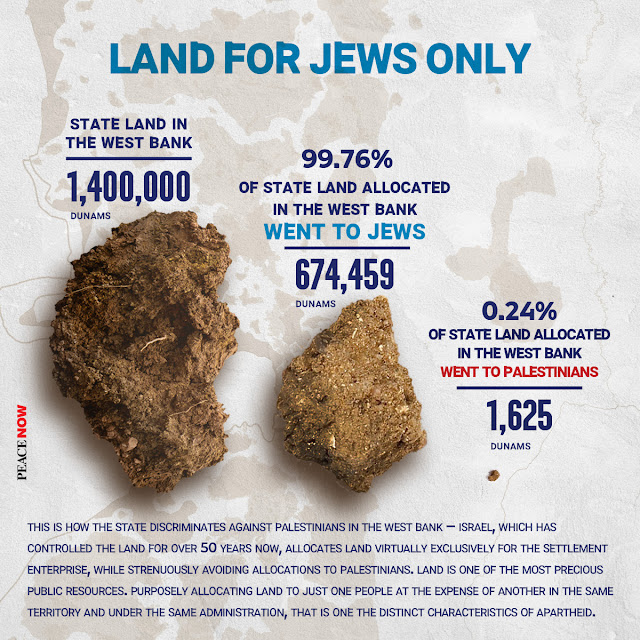
An Israeli Land Council was formed with 22 members – 12 from the ILA and 10 from the JNF. The Israel Land Administration was renamed the Israel Land Authority (ILA) in 2009.
Up to 1948 the JNF had bought 600,000 dunums of land. From thereon the JNF ended up with 2.5 million dunums. There is no evidence that the JNF paid a single shekel for what was stolen property. This constituted 13% of total Israeli land. The other 80% is in the hands of the ILA.
This puts to bed the lie that the JNF’s ‘Jewish land’ was bought with the pennies of Jews in the diaspora. In fact 80% of its land was a stolen gift.
In response to a petition from Adalah in 2004 the JNF claimed that
‘Equality does not mean giving someone the right to live on someone else’s land since, just as the Jews do not have the right to live on Islamic Waqf land, or land belonging to one of the churches, non-Jews do not have the right to choose land given to the Jews for the sake of achieving their right to equality.”
Except that this was Palestinian not ‘Jewish’ land to begin with. The Christian church and the Moslem Waqf don’t own 13% of Israeli land and control another 80%.
Nor do they have leases stipulating that Jews cannot rent or lease their lands.
Israel is unique in capitalist societies in that 93% of its land is owned or controlled by the State. Why is there such a tiny market in private land in Israel? Is Netanyahu a secret socialist? Clearly not.
The answer is because under a free market, Arabs would inevitably penetrate the deepest Jewish settlements. Sooner or later most communities would become mixed. In order to prevent this there are 2 options – one the present system of state control or, as in South Africa, specific legislation confining racial or national groups to specific areas.
only in Cuba and North Korea does the State control a greater percentage of the land.
Instead of, as in South Africa, the equivalent of the Natives Land Act of 1913 and the Group Areas Act of 1950 (1957, 1966) Israel decided that segregation would be enforced by the State sub-contracting out the task to a para-state, nominally non-State body, the Jewish National Fund, in coordination with the Israel Lands Authority/ Administration.
As former Finance Minister Moshe Kahlon joked, only in Cuba and North Korea does the State control a greater percentage of the land. Assuming that that is true, then the reason in those states has nothing to do with ensuring the ethnic division of the land.
How the Settler Right See It
Israel Hayom, the largest newspaper in Israel, a free sheet funded by Sheldon Adelson described the plight of the Sumarin family somewhat differently.
After a 30-year legal battle, a Jerusalem court has ruled that the Sumarin family must vacate a property located in EJ and return it to its rightful owners. The family has been supported by some 30 left-wing organizations with many funded by the European Union.
Nachi Eyal, one of the directors at Himanuta, the real estate company at the heart of the attempt to steal the property of the Sumarin family, applauded the Jerusalem District Court’s decision.
Eyal said ‘I will work with all of my might so that the property will be turned over to its rightful owners.’ Orwell may be dead but 1984 lives on. But according to these people, all Palestinian land is alienated from its ‘rightful owners’ and it is only a matter of time until it is restored.
Below is a piece by someone who visited the Sumarin family, something no right-wing Israeli paper would of course bother to do.

The ethnic cleansing of Jerusalem continues as a family fights imminent eviction
Report from The Canary
Eliza Egret, 18th June 2020
In 2018, I visited the Sumarin family in their EJ home, right by the walls of the historical Old City. Welcoming me with sweet tea and biscuits, Ahmad Sumarin told me about their decades-long fight in the Israeli courts to keep their home. Like other Palestinian families in the Silwan neighbourhood, the Sumarins are in danger of being evicted to make way for Israeli colonisers.
Now, two years later, the family faces one last, urgent battle. On 30 June, the Israeli court will hear the family’s final appeal. “There are six children in this household,” Ahmad explained to me. If the family loses in court, the children will all become homeless.
Why are they being made homeless?
The Sumarins built their home in the 1950s and have lived there for generations. But the Jewish National Fund (JNF), an Israeli NGO and substantial landowner, has been attempting to steal the house for decades, using a dubious Israeli law. Through its subsidiary Himanuta, the JNF intends to hand the house over to Israeli colonisers, amid the Israeli government’s ongoing attempt to ethnically cleanse EJ of Palestinians.
The Campaign
So far, 69 MPs have signed an Early Day Motion (EDM), condemning the JNF’s attempts to evict the Sumarin family. It is noticeable that 37 SNP MPs, virtually their entire contingent has signed the EDM compared to just 21 Labour MPs and 5 Liberal Democrats. The EDM states that:
[The House] reiterates that ethnic cleansing is one of the most serious crimes, and that the UK is committed to upholding international law; urgently requests the Government to intervene on behalf of the Sumarin family, and calls on the Charity Commission to review the charitable status of JNF UK.
Jewish people already made an official complaint to the Fundraising Regulator about JNF in the UK, arguing that it funds activities in contravention of international humanitarian laws.

JUDAISATION
Jewish-Israeli anthropologist and activist Jeff Halper, who founded the Israeli Committee Against House Demolitions (ICAHD) explained that the case of the Sumarin family is yet another expression of a key element of Israel’s colonial policy towards the Palestinians and their lands that gets scant attention: the policy that Israel itself called ‘Judaization’.
The term ‘Judaization’ has been used extensively by Israeli ministers and academics, as well as Israel’s mainstream press, to describe the process of changing the demographics of an area, depopulating its Palestinian Arab and Bedouin communities and settling Jewish people. According to Israeli human rights organisation B’Tselem, EJ is now “home to at least 370,000 Palestinians and some 209,000 Israeli settlers [colonisers]”.
Hundreds of Silwan’s Palestinian residents face eviction to make way for colonisers. The Israeli state has forced others to demolish their own homes. Standing on the roof of the Sumarin home, it’s haunting to see the colonisers’ flags flying from the rooftops of homes that have been stolen.
Wardeh Sumarin explained that:
There are so many [Palestinian] families with this same problem. Every year [the JNF and Himanuta] take more houses, [using] the same law in every house. Israel’s law protects them and lets them take any house they want.
‘We may just save the Sumarin family’
Dick Pitt of campaign group Stop the JNF told The Canary that there is still hope. He stated:
Five days after George Floyd was killed, an unarmed autistic Palestinian, Iyad Halak, was killed by Israeli police as he lay wounded on the floor. For decades the Israeli state has illegally taken Palestinian land, whether on a small scale such as attempts to evict the Sumarin family, or bigger, with the proposed annexation of the Jordan Valley into Israel. Just as the violence and racism of the US police has continued until it is meeting resistance, so Israeli violence and racism will continue until the world says this is unacceptable.
Right now the issues of human rights, opposition to illegal occupation, opposition to ethnic cleansing and basic human compassion line up to say this eviction is wrong. If enough of us act now with petitions, letters, [and] pressure on MPs to sign Early Day Motion 529, we may just save the Sumarin family from unjust eviction.
Contact your MP
ICAHD’s Halper stated:
Using in this case the Jewish National Fund, a quasi-governmental corporation with charitable status in the UK, Israel is expending time, resources and political capital on removing one family on doubtful legal and moral grounds. If this is allowed to happen, if the UK government continues to grant the JNF charitable status, if the Jewish community and other ‘pro-Israel’ voices continue to support policies of Judaization and displacement, then they are all complicit. We of the Israeli Committee Against House Demolitions (ICAHD) call on the British government to protect the Sumarin family and revoke the political JNF’s charitable status.
After decades of fighting to keep their home, the Sumarin family needs everyone with a conscience to take action. “People outside can put pressure on the JNF so that it can’t occupy all the houses it wants,” Ahmad Sumarin told me.
You can contact your local MP, informing them of the plight of the Sumarins and asking them to sign the Early Day Motion. You can also ask MPs to contact the Foreign Office and the Israeli embassy to pressure Israel to stop the eviction. This is the last chance for the Sumarin family.
The Canary asked the JNF to comment on the Sumarin case, but received no reply.
Court rules that the Sumreen family may stay in its East Jerusalem house until the case it settled. JNF, backed by settler group Elad, argues that it owns the building
Ha’aretz 15.12.19. Hagar Shezaf
An Israeli court ruled this week that a Palestinian family may stay in its home in the East Jerusalem neighborhood of Silwan until a final ruling on the Jewish National Fund’s demand to evacuate it is made.
The Sumreen family case is the latest case that left-wing groups are holding up as evidence of a growing cooperation between the JNF and settler organizations in Jerusalem and the West Bank.
After a 30-year legal battle, the JNF in September was granted ownership of the family’s home by the Jerusalem Magistrate’s Court, but the family appealed the ruling and asked to remain in the house until the case is settled.
Jerusalem District Court Judge Chana Miriam Lomp rejected the JNF’s claim that the Sumreens shouldn’t be allowed to stay and its argument that the family’s appeal is unlikely to be accepted. However, Lomp demanded that the family present a 30,000-shekel ($8,6000) guarantee.
The JNF, backed by settler group Elad, claims that one of the family’s ancestors was an “absentee,” i.e., a civilian who lived in an enemy country, as a result of which his property was confiscated by the state – which then sold it to the JNF. Magistrate Court Judge Miriam Kaslassy accepted in September the JNF’s claim of ownership on this basis.
In response, the JNF said that
“KKL-JNF acts and will continue to act in a professional manner in regard to its property, and insists on its lawful rights over lands that it owns, just as the court rouled, regardless of race, gender or religion.”
After the family of 18 appealed to the Jerusalem District Court to prevent their evacuation before a final ruling is reached, the JNF, stressing it operates “in a professional and unbiased manner,” claimed the family has other properties in the city, and therefore would not be harmed by the evacuation of their Silwan home.·
Jewish National Fund Working to Evict Palestinian Family From East Jerusalem·
After 30 Years of Legal Battle, Israeli Court OKs Evacuation of East Jerusalem Family
The first suit seeking the family’s eviction was filed by JNF subsidiary Himnuta in 1991. It was based solely on the determination that the father of the family, Musa Sumreen, was an absentee, and the family won.
The family then filed its own suit, seeking to be declared the property’s owner. But that suit was rejected in 1999 because the family failed to prove it had purchased the property.
Meanwhile, the state determined that Sumreen’s children were also absentees, prompting Himnuta to file a new suit in 2005. Himnuta won that suit, but in 2011 the verdict was vacated on the grounds that family members hadn’t been aware of the legal proceedings against them. The most recent suit was filed in 2017.
Left-wing critics have recently been attacking the JNF, claiming that it has turned into an operational unit of settler organizations. Several months ago, a Palestinian family living on ground owned by the JNF near Bethlehem was evacuated following a request by the organization.
Several days afterward, a settler outpost was set up in the same spot. The JNF says it is only acting to protect its property.
Israel’s Jewish National Fund is uprooting Palestinians – not planting trees
Last month the Sumarins lost a 30-year legal battle waged by the JNF, which was secretly sold their home in the late 1980s by the Israeli state.
The family’s property was seized – in violation of international law – under a draconian 1950 piece of legislation declaring Palestinian refugees of the Nakba “absent”, so that they could not reclaim their land inside the new state of Israel.
The Israeli courts have decreed that the APL can be applied outside Israel’s recognized territory too, in occupied Jerusalem. In the Sumarins’ case, it appears not to matter that the family was never actually “absent”. The JNF is permitted to evict the 18 family members next month. To add insult to injury, they will have to pay damages to the JNF.
A former US board member, Seth Morrison, resigned in protest in 2011 at the JNF’s role in such evictions, accusing it of working with extreme settler groups. Last year the JNF ousted a family in similar circumstances near Bethlehem. Days later settlers moved on to the land.
Ir Amim, an Israeli human rights group focusing on Jerusalem, warned that these cases create a dangerous legal precedent if Israel carries out its promise to annex West Bank territory. It could rapidly expand the number of Palestinians classified as “absentees”.
But the JNF never lost its love of the humble tree as the most effective – and veiled – tool of ethnic cleansing. And it is once again using forests as a weapon against the fifth of Israel’s population who are Palestinian, survivors of the Nakba.
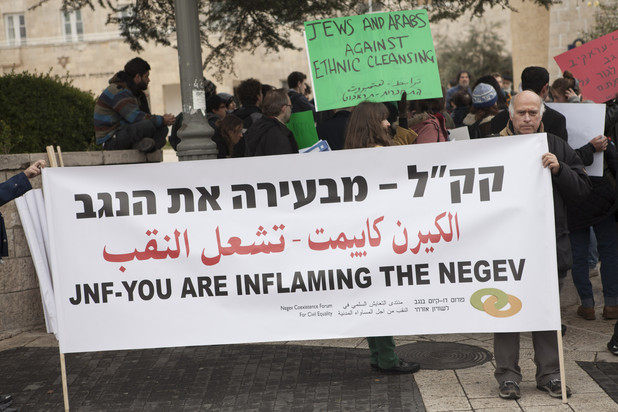
Earlier this year it unveiled its “Relocation Israel 2040” project. The plan is intended to “bring about an in-depth demographic change of an entire country” – what was once sinisterly called “Judaization”. The aim is to attract 1.5 million Jews to Israel, especially to the Negev, over the next 20 years.
As in Israel’s first years, forests will be vital to success. The JNF is preparing to plant trees on an area of 40 sq km belonging to Bedouin communities that survived earlier expulsions. Under the cover of environmentalism, many thousands of Bedouin could be deemed “trespassers”.
The Bedouin have been in legal dispute with the Israeli state for decades over ownership of their lands. This month in an interview with the Jerusalem Post newspaper, Daniel Atar, the JNF’s global head, urged Jews once again to drop money into its boxes. He warned that Jews could be dissuaded from coming to the Negev by its reputation for “agricultural crimes” – coded reference to Bedouin who have tried to hold on to their pastoral way of life.
Trees promise both to turn the semi-arid region greener and to clear “unsightly” Bedouin off their ancestral lands. Using the JNF’s original colonial language of “making the desert bloom”, Atar said his organization would make “the wilderness flourish”.
The Bedouin understand the fate likely to befall them. In a protest last month they carried banners: “No expulsions, no displacement.”
After all, Palestinians have suffered forced displacement at the JNF’s hands for more than a century, while watching it win plaudits from around the world for its work in improving the “environment”
The Jewish National Fund Should Stop Trying to Kick a Palestinian Family Out of Their Home
The JNF used to symbolize the hope for planting and rebuilding. Now it is acting as a proxy for settler groups bent on evicting a family of 18 from their home in the EJ neighborhood of Silwan
(this is untrue – the JNF was always a colonising agency which sought the transfer of the Palestinians – TG)
Published on 30.12.2019
I moved to Jerusalem more than 35 years ago. I walk to my office most days, and my route often takes me past the outskirts of the EJ neighborhood of Silwan. It is there that a drama as sad as it is superfluous, as cruel as it is crazy, has been playing out for three decades. It is one case among many, and as I mark the holiday of Hanukkah in peace and security, it is on my mind.
The Sumreen family lives in Silwan. Since 1991 they have been involved in a legal struggle with the Jewish National Fund, backed by the settler group Elad and various other agencies committed to consolidating the Jewish presence in Palestinian neighborhoods of Jerusalem. These groups have been trying to have the Sumreens evicted by arguing that some members of the family were “absentees” – that is, civilians who lived in an enemy country – as a result of which their property was confiscated by the state, which then sold it to the JNF.
This claim is centered on an aggressive and controversial interpretation of the Absentees’ Property Law of 1950. After many twists and turns, a Jerusalem court ruled in September that not only must the family leave, but that they must also pay considerable damages. As the court battle continues, earlier this month, a judge decided the family could stay in the house while they appeal the ruling.
While the JNF says it is only trying to protect its property, it is acting as a proxy for settler groups in this and similar cases. Months ago, a Palestinian family living on ground owned by the JNF near Bethlehem was evacuated following a request by the organization: several days later, a settler outpost was set up in the same spot. The practical effect of the JNF’s campaign against the Sumreens is that this family of 18, guilty of no crime and accused of no wrongdoing, may soon find itself without a home, bereft and bankrupt.
Such an outcome would be profoundly unjust, even if it were the result of a lengthy judicial process. It is not like the crimes of violence and vandalism which seem increasingly to plague our world – people gunned down, tires slashed and homes defaced. In this case, everything plays out in slow motion, and there are piles of paperwork and precedents. But as I celebrate the freedom and independence symbolized by Hanukkah, this displacement sickens me. Justice is not served. Insisting on the payment of damages adds insult to injury.
One of Israel’s most remarkable poets is Almog Bahar. In a 2010 poem he refers to a protest in which he participated in another flashpoint EJ neighborhood, Sheikh Jarrah. As the court-sanctioned removal of the Sumreens from their home looms, a verse comes to mind:
And one night I dreamt: We’ll come to Sheikh Jarrah for a protest,
regiment by regiment of the expelled, and with us will march the Yemenites expelled from the Kineret village, the Jewish Hebron refugees of 1929, the Arabs of Ba’ka, Talbieh, Katamon, Meah Sha’arim, Lifta and Ein Karem expelled during the Nakba, the Jewish quarter refugees expelled in ’48 by Jordan, and in ’67 their homes were nationalized by the government of Israel to be sold for great profit leaving them refugees, the Palestinians expelled from the villages surrounding Latrun in ’67, the Mizrahim expelled from the Yemin Moshe neighborhood after years in the eye of the target, to make room for painters and artists, the residents of unrecognized Bedouin villages in the Negev, the mortgage defaulters expelled from their homes by eviction crews, the Jaffa and Musrara residents forced to vacate their homes to make way for the rich, and the people of Silwan, a demolition order threatening their homes.
All of us are divided only by chance from the experience of displacement. A generation or two ago, and possibly again in the space of a few generations, we or the ones we love have experienced or will experience the sting of eviction. My parents did, and I pray my children will not. The awareness of the proximity of this cruel fate to our own lives should spur us to empathize, and then to mobilize. Must the Sumreen family be added to the long list of the displaced? Can a solution not be found that preserves legality and dignity, elementary fairness and due process?
In the 20th century, the Jewish National Fund symbolized the hope for planting and rebuilding. Let’s hope that as the day of the Sumreens’ eviction approaches, the leaders of the JNF remember that trees, and homes, and families, should be planted. Not uprooted.
Rabbi Michael Marmur Chairs the Board of Rabbis for Human Rights.
The Eviction of One Palestinian Family Might Cause the Next Political Crisis Over EJ
Hagit Ofran, Contributor/Director, Settlement Watch project: Israeli Peace Now movement 11/17/2011 06:31 pm ET Updated Dec 06, 2017
August 2nd, 2009. The Ghawi and Hannun families of Sheikh Jarrah in EJ are waking to the sounds of police and trucks and movers. In a few hours, their houses will have become the home to settler families, and they will be kicked out to the street.
Those images are flashing back to me as I think of what could happen in two weeks in Silwan. We’ve seen those pictures in the past: Palestinian family out, Israeli settlers in. Sometimes the house is legally bought by the settlers; sometimes it is the implementation of the “right of return” to properties that belonged to Jews before 1948 (like in the case of Ghawi and Hannun); and sometimes it is because the Israeli Authorities decided to use the Absentee Property Law in order to take over the Palestinian house and give it to the settlers.
The Sumarin family has been living for decades at the entrance to the Wadi Hilweh neighborhood of Silwan, not far from Al-Aqsa Mosque. Two months ago, the court scheduled their eviction for November 28, 2011 in a ruling handed down in the absence of defense by the Sumarins. Their house is considered by the authorities as a property of an absentee, and therefore, it was transferred to the hands of the Himanuta company which requested the eviction.
In Silwan there is a fight over nationality, history and also religion. For the Palestinians, it is a Palestinian neighborhood, next to Al-Aqsa Mosque where thousands of Palestinians have been living for ages. The settlers are trying to make it into “The City of David,” using archaeology and tourism to change the public domain in Silwan. The visitors center of the “City of David” tourism site was built by the settlers next to the house of the Sumarin family. If taken by the settlers, the Sumarin house would give them a large contiguous area at the very entrance to Silwan and dramatically change the character of the neighborhood.
For the last 20 years the Jewish National Fund has been acting to transfer Palestinian property in EJ to the settlers. Tens of dunams of land and homes housing dozens of Palestinians in Silwan were evacuated by the JNF through various legal proceedings and transferred to settlers. In many cases the JNF does this through its subsidiary Himnuta, whose shares are held by the JNF.
The barter deal in Silwan: absentee land turns into JNF land in order to give it to settlers
In the 1980s and early 1990s, dozens of properties in Silwan were declared absentee properties and sold to the Development Authority. According to the law, the Development Authority and the Israel Land Administration are required to administer their assets equally without discrimination based on nationality. Conversely, the JNF and Himnuta operate according to a JNF memo that provides that its assets be leased or transferred to the possession of Jews only. In order to bypass the requirement of equality, the authorities in the early 1990s used the JNF and Himnuta to transfer property in Silwan to the settlers.
On May 23, 1991, a barter deal was signed between the Development Authority and Himnuta, according to which the Development Authority was to transfer 30 dunams of absentee property in Silwan to Himnuta in exchange for land it owns in the Wadi Ara area. The purpose of the deal, as defined by the director of the land Department in the JNF and Himnuta, was “for those properties to be under Jewish ownership.” Later, some of the properties were leased to the Elad settler organization without a tender.
Most of the properties were inhabited by Palestinian families that did not even know that their homes were declared absentee property, sold in a barter deal to Himnuta and leased to settlers. Himnuta began demanding the Palestinian tenants be evicted from their homes through legal actions. Among the properties transferred in this way to Elad are Beit Hamaayan (“the well house”), which serves as a tourist and archaeological excavation site, and Beit Hatzofeh (“the lookout house”), which serves the organization as part of its tourist site and visitors center as well as serving as a settler residence.
“The Klugman Report” — The machine was stopped, but never killed
Following the election of the Rabin Government in 1992, a special investigation committee, “the Klugman Committee,” was assigned to investigate the conduct of the authorities with regards to EJ properties that were given to the settlers. The committee described how the Ministry of Housing (under Ariel Sharon as a Minister) facilitated and funded the transfer of Palestinian properties in the Old City and Silwan into the hands of settler organizations. One of the methods to take over properties was the use of the Absentee Property Law. Among the Committee’s key findings were:·
- Properties had been systematically allocated based on criteria that violated the principles of equality, and contrary to rudimentary procedures.
- The settler organizations located the properties they were subsequently to receive from the State, based on affidavits which they themselves arranged and confirmed.
- The CAP failed to exercise even minimal discretion.
- No tenders had been issued, and it was the political echelon of the Ministry of Housing that instructed which organization would receive which asset.
Following the Klugman Report, the machine that was established in order to assist the settlement at the heart of Palestinian neighborhoods in EJ was stopped. However, some of the procedures that started at the early ‘90s, continued. To this day, Himnuta continues pursuing legal claims against Palestinian residents based on the barter deal from 1991. At least three families in Silwan are at risk of eviction after years of long and expensive legal proceedings that have not yet ended. The Sumarin family is one of them.
As a Jew, I feel ashamed that Himnuta and the JNF, which are claiming to act in the name of the Jewish people, are continuing to use their organization in order to kick out Palestinian families from their homes, and to bring in Jewish families instead. This is not only politically wrong and dangerous, but also immoral.
The eviction can still be stopped: Himnuta can decide, instead of giving the property to settlers, to give it to the Palestinian family that has lived in it for years. The Israel Police can decide not to assist in the eviction of the family and to prevent it. The police have avoided evicting settlers from Beit Yehonatan in Silwan for more than three years, even though the court has repeatedly ordered to evict them. The attorney general has asserted on different occasions that if the police believe there is a threat to public security it must prevent right holders from realizing their rights at that time.
The only question is whether the authorities will have the political wisdom to prevent the upcoming provocation in Silwan.The Jewish National Fund Is Trying to Kick a Palestinian Family Out of Their Home. The Court Stopped It – for Now
Israeli Supreme Court Stays Eviction of Palestinian Family from EJ Home
Israel can now legally seize Palestinian homes in Jerusalem under ‘absentees’ property law